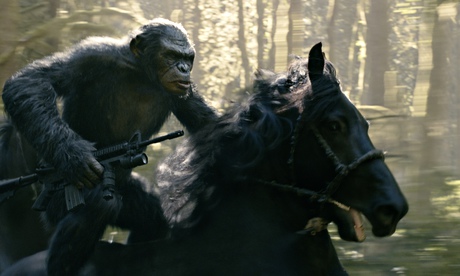
From its origins in Pierre Boulle's Swiftian 1963 novel La Planète des singes to this state-of-the art 21st-century 3D-CG cinema outing, the darkly satirical Apes saga has proved both resilient and flexible. Born amid the social upheavals of the late 60s and early 70s, the first cycle of five movies (Planet, Beneath, Escape, Conquest and Battle) covered all the hot political topics of the day; nuclear destruction, racism, vivisection, apartheid, slavery, warfare v diplomacy, revolution and, ultimately, reconciliation (Battle ends with an unsteady truce and the hope of averting foretold catastrophe).
Tim Burton's stylish but empty 2001 Planet remake somehow lost the thematic plot; advanced prosthetics enabled the ape actors to move their mouths only to discover that they had little of substance to say. It took British director Rupert Wyatt to get things back on track with his 2011 reboot, Rise of the Planet of the Apes, using eye-catching performance-capture technology in service of a solid script (by Rick Jaffa and Amanda Silver) that married the political clout of Conquest with the animal-rights themes of Boulle's source. In the original film series, a time-travel loop was required to teach apes to say "No"; in Rise, bio-engineered science did the trick, the search for a cure for Alzheimer's becoming the accidental catalyst for a simian revolution.
Dawn picks up the story 10 years after the end of Rise, with Caesar (a brilliant Andy Serkis, once again performance-captured by the wizards at Weta Digital) and his comrades building a community in Muir Woods following the ravaging of San Francisco. Believing the humans to have died out (a "simian flu" pandemic provided an apocalyptic footnote to Rise), the 2,000-odd gorillas, chimpanzees and orang-utans live a peaceful and prosperous existence until a chance encounter with a group of virus-resistant survivors provokes trigger-happy tragedy. Facing ancient foe, both men and monkeys are torn between the desire to co-operate and the urge to obliterate, the alarums of war booming ominously in the background.
Carefully balancing its sympathies, Dawn establishes mirror-image figures on both sides of the species divide: in the peace camp, Caesar, Cornelia (Judy Greer) and troubled son Blue Eyes (Nick Thurston) are matched by neo-nuclear human family unit Malcolm (Jason Clarke), Ellie (Keri Russell) and Alexander (Kodi Smit-McPhee); in the war room, Gary Oldman's militaristic Dreyfus is the human counterpoint for embittered bonobo Koba (Toby Kebbell). While Serkis remains the king of the cinematic swingers (his Kong and Caesar both rule), Kebbell gives him a run for his money as the scarred survivor of an experimentation lab, threatening to steal the show from the maestro as his character launches a Lucifer-like rebellion against his lord and master. And when the battles come, Cloverfield director Matt Reeves (who inherited the project from Wyatt) handles the action sequences with aplomb, keeping his eye on character even as grand spectacle reigns – the key to maintaining an element of dizzying danger.
Shot largely on location in the forests of Vancouver, Dawn benefits greatly from capturing the actors' performances in the wild. While the "native 3D" remains a take-it-or-leave-it addition (the best I can say is that it bothered me less than usual), the organic scope of the digitised character creation is breathtaking, using the technology to tell the story from the point of view of the apes, who remain the primary focus of the narrative. Remember, it took the original series three movies before we really began to see the world through other than human eyes. This latest reboot, which quotes directly from Battle, revels in the opportunity to make the homo-sapiens the secondary species. The end result plays like a cranked-up simian riposte to the French-Canadian film Quest for Fire, or an alternative-universe extension of the "dawn of man" sequence from Kubrick's 2001: A Space Odyssey, which went head to head with the original Planet of the Apes in 1968.
There are, of course, some shortcomings. The lack of decent female roles is depressing (anguished mothers are sidelined as the pace of the action increases), and I suspect that some of the wobblier visual elements will not age well; like all films built upon cutting-edge technology, the danger of accelerated obsolescence is very real. There's an over-reliance, too, on the spoken word; while Mark Bomback (who rewrote Jaffa and Silver's script after Wyatt departed) claims to have resisted the "temptation to just give the apes pages and pages of dialogue", there's a certain loss of nerve in the change from convincing simian sign language to more theatrical chimp verbosity. The impact of Caesar's original "No!" is inevitably diluted as single words turn into sort-of speeches.
What redeems it all is the sense that the film-makers take their subject matter seriously and imagine their audience to be as sentient as their simian screen counterparts. While Michael Bay's wretched Transformer movies continue to treat everyone like a "damn dirty ape", Reeves, Serkis and co seem proud to expect more from their audience, rising to the challenges (rather than sinking to the depths) of blockbuster entertainment. Good for them.

